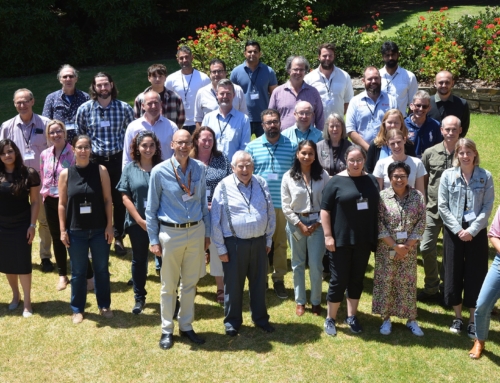We love visits from our global plant science community, so it was a treat to host Ruth Bastow, Executive Director of the Global Plant Council (GPC), this week.
While she was here, we took the opportunity to ask a few quick questions:
Ruth, could you tell us a little bit about the GPC?
The GPC is a not-for-profit coalition of national, regional, and international societies and affiliates representing thousands of plant, crop, agricultural, and environmental scientists. We bring together all those involved in plant and crop research, education and training, to provide a body that can speak with a single, strong voice in the policy and decision-making arena, and to promote plant science research and teaching around the world.
What do you do there?
As Executive Director of the GPC I am responsible for the day to day management of the organisation.
What is the reason for your visit here?
To meet up and discuss GPC initiatives with colleagues here at the University of Adelaide, to further develop current collaborations and hopefully initiate new ones.
For example the Australian Plant Phenomics Facility (APPF) is partner of the Diversity Seek Initiative (DivSeek). DivSeek is a global community driven effort consisting of a diverse set of partner organisations have voluntarily come together to enable breeders and researchers to mobilise a vast range of plant genetic variation to accelerate the rate of crop improvement and furnish food and agricultural products to the growing human population. DivSeek brings together large-scale genotyping and phenotyping projects, computational and data standards projects with the genebanks and germplasm curators. The aim is to establish DivSeek as a hub to connect and promote interactions between these players and activities and to establish common state-of-the-art techniques for data collection, integration and sharing. This will improve the efficiency of each project by eliminating redundancy and increasing the availability of data to researchers around the world to address challenges in food and nutritional security, and to generate societal and economic benefit.
So, whilst I am here, I will be learning about how the APPF team collate and analyse their data and try and understand how the approaches here could be translated into solutions for the wider community. For example, the Zegami platform used in the high-throughput phenotyping Smarthouses™ at the Adelaide node is a useful visualisation tool that could benefit others.
Where else have you visited?
Whilst I am here in Australia I have been working with colleagues in Canberra including Prof Barry Pogson who is currently the chair of the Global Plant Council, Dr Xavier Sirault (APPF node based at CSIRO), Prof Justin Borevitz (APPF node based at ANU), and Dr Norman Warthmann. I will also be taking time to visit friends in Sydney and on the Central Coast.
Where do you see plant phenomics research in 5-10 years time?
High throughput and field based phenotyping has seen huge transformational change in the last decade and in the next 5-10 years I hope that it will start to become part of the everyday toolkit of plant science researchers in the way that genomics has.
If you could solve one plant science question what would it be?
I would actually like to try and solve a social/conceptual problem that effects science rather than an actual biological question and that is the sharing of data, information, knowledge and best practice. The sharing of scientific theories, including experimental data and observations has been a core concept of the scientific endeavour since the enlightenment. Sharing allows others to evaluate research (peer review), to identify errors, and allow ideas to be corroborated, invalidated and built upon. It also facilitates the transmission of concepts and theories to a wider audience and that will hopefully inspire others to get involved in science, contribute ideas and further our understanding of the world around us.
However, the current systems of reward and evaluation in science; lack of appropriate mechanisms, standard and infrastructures to easily share and access information; and in some cases the debilitating effects of ‘IP thickets’ can act as a barrier to ‘open science’. It is not all bad news. In the last decade a number of changes at the government, funder, publisher and institutional level have promoted and facilitated the concept of open science. However, if science is to be a truly open endeavour it will require a change in mind-set at many levels to migrate towards a culture where open data is the norm. Without this we will not be able to fully realise the investment in research, in terms of both finance provided and the time and intellectual contribution of the individual involved, and contribute to developing solutions that will help ameliorate current global problems.
When I am not working I am?
Walking the dog or gardening and generally enjoying the beauty of my home in South Wales in the UK.
If you could have one super power what would it be?
For my work it would probably be telepathy or omnilinguism, as most problems seems to arise from lack of understanding or miscommunication at some level, so these would be very helpful superpowers. From a personal perspective perhaps the ability to predict the future would be good.






